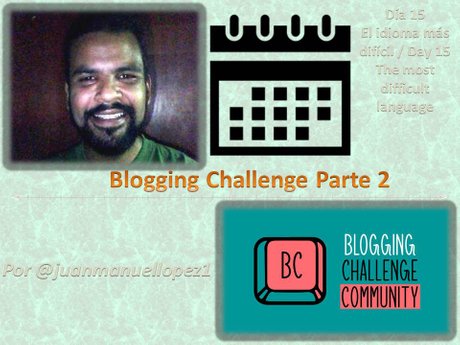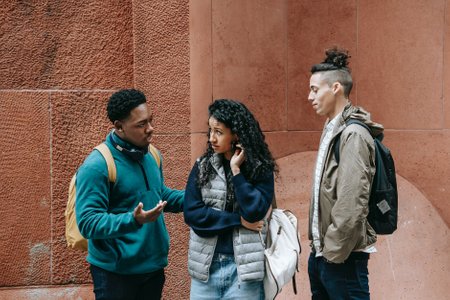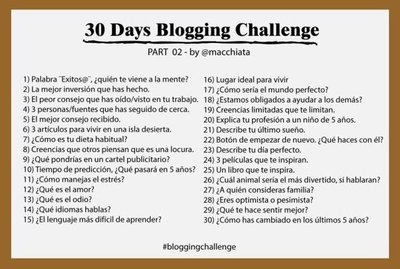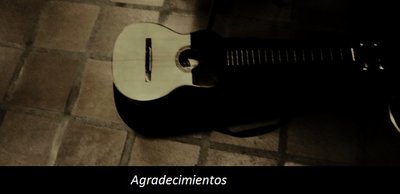
Quinceavo día del 2do reto / Fifteenth day of the 2nd challenge

Espanish
Finalmente ya he llegado a la mitad de este maravilloso reto, con la satisfacción de contar con el apoyo de la comunidad Smile, y de muchas otras comunidades a las que también les expreso mis agradecimientos. Todavía hay camino para recorrer en este reto del Blogging Challenge y deseo hacerlo con todos ustedes.
Es un gusto compartir palabras y pensamientos producto del análisis y de la expresión de nuestro ser, con personas que de verdad valoran todas estas cosas que mostramos en este reto a través de nuestras publicaciones. Más que el apoyo recibido en esta plataforma de las formas que hemos visto desde siempre, es todo lo que ese apoyo significa y la razón de poder recibirlo lo que realmente tiene un gran valor para todos nosotros, porque significa entre otras cosas que nuestras ideas, nuestro conocimiento y nuestra presencia tiene un valor para todas las manos que nos apoyan.
Espero que este siguiente trabajo también sea del gusto de todos ustedes, y que lo puedan disfrutar mucho, esa es la idea principal, y lo primero que tenemos en mente todos los que trabajamos en esta plataforma que todavía tiene mucho que darnos.
English
I have finally reached the halfway point of this wonderful challenge, with the satisfaction of having the support of the Smile community, and many other communities to whom I also express my gratitude. There is still a long way to go in this Blogging Challenge and I want to do it with all of you.
It is a pleasure to share words and thoughts product of the analysis and expression of our being, with people who truly value all these things that we show in this challenge through our publications. More than the support received on this platform in the ways we have always seen, it is everything that this support means and the reason for being able to receive it that really has a great value for all of us, because it means among other things that our ideas, our knowledge and our presence has a value for all the hands that support us.
I hope that this next work will also be to the liking of all of you, and that you can enjoy it a lot, that is the main idea, and the first thing we have in mind all of us who work on this platform that still has a lot to give us.
Once again I dedicate my thanks to the entire Smile community for all these initiatives and especially for the support they give to all of us in their spaces.


Foto de Keyra Burton en Pexels - Photo of Keyra Burton in Pexels
Espanish
Normalmente esto solo podría tener un tipo de respuesta típica acerca de que un determinado idioma o lenguaje es el más difícil de todos ya sea por sus caracteres, o por la forma de armar las sílabas y pronunciarlas, o por los significados que algunas veces pueden ser difíciles de interpretar, porque es difícil de escucharlo, o cualquier otra razón que tenga que ver con la práctica de ese idioma.
En los últimos años he preferido ser un poco más abierto de mente, tratando de entender lo que define las cosas que tengo que aprender, porque he tenido que descubrir a raíz de bastantes experiencias pasadas, que muchas de las cosas de las que intentamos huir para no intentar dominarlas resultan siendo las más fáciles de ejecutar, y que no todo es tan difícil después de intentar varias veces. He tenido la fortuna de descubrir muchas cosas a tiempo para integrarlas a mi vida, así como también he tenido que descubrir muchas otras cosas demasiado tarde, y he perdido la oportunidad de hacer cosas interesantes en varias épocas. Francamente pienso que asumir a primera vista que algún reto es demasiado difícil para no intentarlo probablemente hasta nos salga más caro que atrevernos a intentarlo, aún si no perdemos nada más que una oportunidad. Es que las oportunidades son verdaderamente oro cuando llegan, sobre todo porque nunca sabemos cuando las volveremos a ver.
Por lo que obviamente esto no solamente es aplicable a los idiomas, sino también a cualquier reto o tarea que se nos presente para ser asumido. Personalmente creo que no hay nada de lo que al presentarsenos como un reto muy difícil no podamos comprobar con hechos que, al intentarlo no sea posible por lo menos aprender algo útil que nos permita avanzar. Aún sin lograr los objetivos quedan los aprendizajes que nos generan tales experiencias, ampliando nuestra visión acerca de tal reto o tarea para asumir, y tal vez otro día si se pueda terminar de concretar esos objetivos.
English
Normally this could only have a kind of typical response about a certain language or language being the most difficult of all either because of its characters, or the way the syllables are put together and pronounced, or the meanings that sometimes can be difficult to interpret, because it's hard to hear it, or any other reason that has to do with the practice of that language.
In the last few years I have preferred to be a little more open minded, trying to understand what defines the things I have to learn, because I have had to discover from quite a few past experiences, that many of the things we try to run away from in order not to try to master them turn out to be the easiest to execute, and that not everything is so difficult after trying several times. I have been fortunate enough to discover many things in time to integrate them into my life, just as I have had to discover many other things too late, and have missed the opportunity to do interesting things at various times. Frankly I think that assuming at first sight that some challenge is too difficult not to try it will probably even cost us more than daring to try it, even if we don't miss anything more than an opportunity. Opportunities are truly golden when they come, especially because we never know when we will see them again.
So obviously this applies not only to languages, but also to any challenge or task that comes our way to be taken on. Personally I believe that there is nothing that when presented as a very difficult challenge we cannot prove with facts that, by trying it, it is not possible to at least learn something useful that allows us to move forward. Even without achieving the objectives, the learning that such experiences generate remain, broadening our vision about such challenge or task to be assumed, and maybe another day we can finish achieving those objectives.

Y como los lenguajes no escapan a esta realidad.... entonces, para llegar al objetivo del tema de hoy..... ¿Cual es lenguaje más difícil de aprender? A esto yo le doy dos respuestas.
La primera es que realmente el idioma más difícil de aprender es aquel que no se practica..... así de sencillo. Puede ser que tengamos la oportunidad de aprender un idioma cuyas palabras sean fáciles de recordar, que todos sus conectores tengan sentido para nosotros, y que sea muy manejable por cualquiera....... Pero si no lo practicamos jamás vamos a aprender nada. Nunca será suficiente leer y aprenderse todos los libros, guías y tutoriales que existen en el mundo porque lo único que ese material de apoyo nos puede ofrecer es información. Y para poder aprovechar la información tenemos que probarla de algún modo, sino es muy probable que la olvidemos en algún momento.
Aún repasando y memorizando textos hay muchos detalles que los podemos olvidar fácilmente si esos detalles realmente no significan nada para nosotros.
De verdad es necesario contar con el ingrediente que activa todo el aprendizaje que nos puede ofrecer la información, y que le da sentido a cualquier visión nueva que estemos buscando..... Y ese ingrediente sin duda alguna es la experiencia. Es necesario vivir eso que intentamos aprender, para luego dar el paso de integrar estas cosas a nuestro día a día.
Las llamadas lenguas muertas tienen esta denominación por una muy buena razón..... Son lenguajes que cayeron en desuso bien sea al morir algunas civilizaciones, o por la transculturización de los pueblos, y en gran parte por causa del contexto social que vetó algunas expresiones o simplemente que le quitó el sentido al uso de tales expresiones. Y ahora en el mundo son muy contadas las personas que son expertas en lenguas muertas, quienes no usan esos lenguajes para interactuar con una comunidad sino para interactuar con el pasado histórico. En pocas palabras no podemos dejar de escudriñar ese lenguaje que estamos aprendiendo, y de buscar la ocasión para aplicarlo interactuando con la comunidad que se comunique en ese idioma.
And as languages do not escape this reality.... then, to get to the point of today's topic..... Which language is more difficult to learn? To this I give two answers.
The first is that actually the most difficult language to learn is one that is not practicable..... just like that. We may have the opportunity to learn a language whose words are easy to remember, whose connectors all make sense to us, and which is very manageable by anyone..... But if we don't practice it we will never learn anything. It will never be enough to read and learn all the books, guides and tutorials that exist in the world because the only thing that this support material can offer us is information. And in order to take advantage of the information we have to try it in some way, otherwise it is very likely that we will forget it at some point.
Even if we review and memorize texts, there are many details that we can easily forget if those details do not really mean anything to us.
It is really necessary to have the ingredient that activates all the learning that information can offer us, and that gives meaning to any new vision we are looking for...... And that ingredient is undoubtedly experience. It is necessary to live what we are trying to learn, in order to then take the step of integrating these things into our daily lives.
The so-called dead languages have this denomination for a very good reason...... They are languages that fell into disuse either at the death of some civilizations, or by the transculturation of peoples, and largely because of the social context that vetoed some expressions or simply removed the meaning of the use of such expressions. And now in the world there are very few people who are experts in dead languages, who do not use those languages to interact with a community but to interact with the historical past. In short, we cannot fail to scrutinize the language we are learning, and to look for the occasion to apply it by interacting with the community that communicates in that language.


Foto de Mikechie Esparagoza en Pexels - Photo of Mikechie Esparagoza in Pexels
La segunda respuesta que le doy a esta pregunta sobre el lenguaje más difícil de aprender es una con la que me atrevo a invitar a ubicarnos en nuestra realidad personal a todas las personas que quieran aprender un lenguaje nuevo. Porque para mí el segundo lenguaje más difícil de aprender es aquel que no representa una verdadera motivación para nosotros. Puede que suene muy sencillo o muy obvio, pero la realidad es que mucha gente no se da cuenta o tienen miedo de asumir que muy en el fondo no sienten deseos de aprender a dominar ese lenguaje.
Desde luego mi intención no es juzgar a nadie con mis palabras, porque la motivación o la falta de ésta es un asunto de cada quien, y es muy válido y respetable. Nadie tiene porque sentir motivación para aprender a interactuar con todos los lenguajes del mundo. Solo que nisiquiera es sano mantenernos en el engaño de que no aprendo este lenguaje por falta de tiempo, porque tengo mucho trabajo, o hasta “me da mucha pereza”. Sencillamente no existe una motivación real que nos impulse a hacer este proceso en nuestras vidas, porque el aprendizaje de un idioma al igual que cualquier otro aprendizaje es todo un proceso, y los procesos para nosotros los seres humanos son difíciles, y muchas veces implica mucho sacrificio.
The second answer I give to this question about the most difficult language to learn is one with which I dare to invite everyone who wants to learn a new language to place ourselves in our personal reality. Because for me the second most difficult language to learn is the one that does not represent a real motivation for us. It may sound very simple or very obvious, but the reality is that many people do not realize or are afraid to assume that deep down they have no desire to learn to master that language.
Of course my intention is not to judge anyone with my words, because the motivation or lack of it is a matter of each person, and it is very valid and respectable. Nobody has to be motivated to learn to interact with all the languages in the world. It is just that it is not healthy to keep us in the delusion that I do not learn this language because of lack of time, because I have too much work, or even "I am too lazy". There is simply no real motivation that drives us to make this process in our lives, because learning a language like any other learning is a whole process, and processes for us human beings are difficult, and often involves much sacrifice.


Foto de Anna Shvets en Pexels - Photo of Anna Shvets in Pexels
¿Y cual sería una motivación real para decidirnos a aprender un nuevo lenguaje? Esto puede variar según la vida de cada quien y las expectativas personales que surjan, pero la que nunca puede faltar es la necesidad de interactuar con una comunidad en específico. Quiero aprender a hablar el idioma tal porque hay un grupo de personas con quienes me interesa hablar para conseguir cosas muy importantes para mi, en mi trabajo, estudios, carrera, en mi vida familiar, o sencillamente quiero hacerme amigo de esas personas. Así tengamos de frente el reto de aprender a hablar algún idioma asiático como el chino, japonés, o mandarín, con todos esos caracteres raros y pronunciaciones complicadas...... si tenemos necesidad de interactuar con algún grupo importante de estas comunidades entonces eso será suficiente motivación para estar puntuales en la puesta en práctica de estos idiomas.
La motivación nos concede el ambiente, la ocasión y el contexto para interactuar y formar parte de las comunidades con quienes queremos interactuar. Además nos ayuda a ser sinceros con nosotros mismos haciéndonos tomar las decisiones que mejor van con nuestros propósitos planteados. Si no hay una verdadera razón para aprender un determinado idioma entonces hagamos lo que hagamos nunca llegaremos a ese resultado, así tengamos los mejores profesores o el mejor material de apoyo.
And what would be a real motivation to decide to learn a new language? This may vary according to the life of each person and the personal expectations that arise, but the one that can never be missing is the need to interact with a specific community. I want to learn to speak the language because there is a group of people I want to talk to in order to achieve very important things for me, in my work, studies, career, in my family life, or I simply want to become friends with those people. Even if we face the challenge of learning to speak an Asian language such as Chinese, Japanese, or Mandarin, with all those strange characters and complicated pronunciations ...... if we need to interact with an important group of these communities then that will be enough motivation to be punctual in the implementation of these languages.
Motivation provides us with the environment, the occasion and the context to interact and be part of the communities with whom we want to interact. It also helps us to be honest with ourselves by making us make the decisions that best suit our purpose. If there is no real reason to learn a certain language then no matter what we do we will never reach that result, even if we have the best teachers or the best support material.

Estas son cosas que he vivido en carne propia porque tal como lo expresé en el post anterior para este reto, no hablo en otros idiomas diferentes al español.... realmente nunca tuve una motivación real para hacerlo en ese momento, tan solo era un niño en ese entonces, por lo que no tenía madurez y mucho menos una visión que me hiciera ver que necesitara aprender aunque sea el idioma inglés, el cual siempre fue una asignatura obligada en la escuela y el liceo. En cambio con el lenguaje de la música aunque tuviera una visión corta, ya yo me veía como músico interactuando con otros músicos a través de este lenguaje que tendríamos en común. Y mucho más al interpretar el idioma de la música venezolana, ese compendio musical de raíz tradicional en el que tanto me he desarrollado durante años, integrando estudiantinas, ensambles, y otras agrupaciones de las que formé parte en su momento, además de todas las demás oportunidades que tuve para mostrarme como cuatrista. Un gran ejemplo de esto que les quiero mostrar es que hace dos años cuando participé en la Siembra del Cuatro vía online, me gané un amigo que le gustó mucho la composición con la que participe. Se trata del cuatrista Yasuji D' Gucci, al cual tuve la oportunidad de conocer en redes dentro del marco de este concurso nacional, y me pidió compartir la partitura de ese tema para estudiarlo en su casa. Y yo con gusto pude compartir ese material y otros materiales hechos por mi. El punto llamativo es que este cuatrista es de Japón, Tokio, y el domina bien el español. Pero aunque esto último no fuese posible igualmente hubiera podido compartir con él mis partituras, ya que tenemos ese lenguaje en común. No hablamos los mismos idiomas geográficos pero si compartimos el lenguaje de la música venezolana, del cual Yasuji es un intérprete entusiasta que emprendió su propio camino como músico y luthier de una manera magistral, y que representa un verdadero aporte para la música venezolana.
Todas las cosas en la vida son difíciles, no existe nada que sea fácil de hacer. Otra cosa es que tengamos toda la vida haciendo una determinada actividad o practicando alguna habilidad, pero eso no nos quita el pasado donde vivimos nuestro proceso de aprendizaje hace años. Lo que realmente hace la diferencia es la motivación que se pueda generar en nosotros para emprender ese camino que deseamos, sea cual sea. Y esto es totalmente cierto para los idiomas, lenguajes y todo lo se nos presente en el camino para ser emprendido.
These are things that I have lived in my own flesh because as I expressed in the previous post for this challenge, I don't speak in languages other than Spanish.... I never really had a real motivation to do it at that time, I was just a kid at that time, so I had no maturity and much less a vision that made me see that I needed to learn even English, which was always a required subject in school and high school. On the other hand, with the language of music, even though I had a short vision, I already saw myself as a musician interacting with other musicians through this language that we would have in common. And much more when interpreting the language of Venezuelan music, that musical compendium of traditional roots in which I have developed so much over the years, integrating estudiantinas, ensembles, and other groups of which I was part at the time, in addition to all the other opportunities I had to show myself as a cuatrista. A great example of this that I want to show you is that two years ago when I participated in the Siembra del Cuatro via online, I won a friend who really liked the composition with which I participated. He is the cuatro player Yasuji D' Gucci, whom I had the opportunity to meet in networks within the framework of this national contest, and he asked me to share the score of that song to study it at home. And I was happy to share that material and other materials made by me. The striking point is that this cuatrist is from Japan, Tokyo, and he is fluent in Spanish. But even if the latter was not possible, I would have been able to share my scores with him, since we have that language in common. We do not speak the same geographic languages but we do share the language of Venezuelan music, of which Yasuji is an enthusiastic interpreter who embarked on his own path as a musician and luthier in a masterful way, and who represents a true contribution to Venezuelan music.
All things in life are difficult, there is nothing that is easy to do. Another thing is that we have all our lives doing a certain activity or practicing a certain skill, but that does not take away the past where we lived our learning process years ago. What really makes the difference is the motivation that can be generated in us to undertake that path we want, whatever it is. And this is totally true for languages, languages and everything that comes our way to be undertaken.
Enlaces de mis entradas anteriores en el Blogging Challenge 2
- Palabra exitosa / Successful word - Día 1 Reto 2 del Blogging Challenge.
- La mejor inversión que he hecho / The best investment I have ever made - Día 2 Reto 2 del Blogging Challenge.
- El peor consejo que he escuchado en mi trabajo / The worst advice I have ever heard in my job - Día 3 Reto 2 del Blogging Challenge.
- Tres personas que he seguido de cerca / Three people I have followed closely - Día 4 Reto 2 del Blogging Challenge.
- El mejor consejo recibido / The best advice received - Día 5 Reto 2 del Blogging Challenge.
- 3 artículos para vivir en una isla desierta / 3 items for living on a desert island - Día 6 Reto 2 del Blogging Challenge.
- ¿Como es mi dieta habitual? / How is my regular diet?.
- Creencias que otros piensan que es una locura / Beliefs that others think are crazy - Día 8 Reto 2 del Blogging Challenge.
- ¿Qué pondría en un cartel publicitario? / What would I put on a billboard? - Día 9 Reto 2 del Blogging Challenge.
- Tiempo de predicción ¿Que pasará en 5 años? / Prediction time. What will happen in 5 years? - Día 10 Reto 2 del Blogging Challenge.
- ¿Que es el amor? / What is love? - Día 12 Reto 2 del Blogging Challenge.
- ¿Que es el odio? / What is hate? - Día 13 Reto 2 del Blogging Challenge.
- ¿Que idiomas hablas? / What languages do you speak? - Día 14 Reto 2 del Blogging Challenge.

Foto de @blogging-team

Muchas gracias a toda la comunidad Smile por traer estas novedosas iniciativas a esta plataforma creando estos maravillosos resultados. Y muchas gracias a todos ustedes por su valioso apoyo.
¡Saludos!
Thank you very much to the entire Smile community for bringing these innovative initiatives to this platform creating these wonderful results. And many thanks to all of you for your valuable support.
Regards!

Créditos: - Foto de la portada, separadores, banner y firma hechos por @juanmanuellopez1 con los editores Power Point y Paint.
- Logo en la portada del proyecto @blogging-team para la comunidad Smile.
- Cover photo, separators, banner and signature made by @juanmanuellopez1 with Power Point and Paint editors.
- Logo on the cover of the project @blogging-team for the Smile community.

- La mejor inversión que he hecho / The best investment I have ever made - Día 2 Reto 2 del Blogging Challenge.

